Kenneth Atchity's Blog, page 176
December 8, 2014
Author Dennis Palumbo on the Hoyt Hilsman Cable Show
Check out this fun interview with Dennis Palumbo where he talks Pittsburgh, writing jokes for comics of the day, and his work both as a mystery author and therapist.

Published on December 08, 2014 00:00
December 4, 2014
13 Common Weaknesses of Screenplays Submitted for Representation:

1) Your format’s not professional, which is a blatant mark of amateurism--because proper format is easily found on the internet. There are even free programs available that will format your screenplay (Celtx).
2) You haven’t bothered to proofread your work. It’s filled with spelling errors, typos, and repetitions.
3) Your script is filled with clichés and on-the-nose expository dialogue and narrative.
4) It’s never clear who the protagonist is. You don’t know whose story you’re reading.
5) If the protagonist is clear, you often don’t know what his dramatic problem is, and you don’t feel involved with him; you don’t know why you should care about his story. This problem is often left without clarification by the time the script ends.
6) The obstacles your protagonist faces aren’t strong enough, clear enough, or interesting enough to propel the story and captivate an audience.
7 ) Your protagonist doesn’t grow from the beginning of the story to the end.
8) Your antagonist isn’t clearly defined or singular enough to pinpoint.
9) Your protagonist and antagonist aren’t written with stars in mind. Hollywood always wants to know: What great actor or actress will desperately want to play this role?
10) Your story lacks credibility. Characters don’t realistically behave the way they’re supposed to in the situations you’ve created.
11) Your script isn’t written visually; what’s on the page is difficult to interpret for the screen. Similarly, the story is often too internalized; plot isn’t sufficiently outwardly expressed.
12) The climax and conclusion of your script aren’t strong enough, positive enough, and/or satisfying enough to warrant the investment of the reader/audience’s time.
13) Market research hasn’t been done, resulting in subject matter that isn’t sellable in today’s market; the stories aren’t written with any particular audience, market, or platform in mind. Forget about, “just write from the heart.” Write from the heart about things that matter to us all!
Published on December 04, 2014 00:00
December 2, 2014
Amazon Best Sellers in Dystopian Science Fiction
1.
 EHuman Dawnby Nicole Sallak Anderson What Remainsby Nicole R. Taylor After: The Shock (AFTER post-apocalyp...by Scott Nicholson Panic (Wildfire Chronicles Vol. 1)by K.R. Griffiths I Hope You Find Me: Find Me Series 1by Trish Marie Dawson
EHuman Dawnby Nicole Sallak Anderson What Remainsby Nicole R. Taylor After: The Shock (AFTER post-apocalyp...by Scott Nicholson Panic (Wildfire Chronicles Vol. 1)by K.R. Griffiths I Hope You Find Me: Find Me Series 1by Trish Marie Dawson 
Published on December 02, 2014 00:00
December 1, 2014
Marilyn Horowitz's the Book of Zev Available for 99 cents TODAY!
“What would you do if you knew you could stop evil?”
An exciting thriller about two gentle people who prevent a terrorist from blowing up the U.N. and Israel.

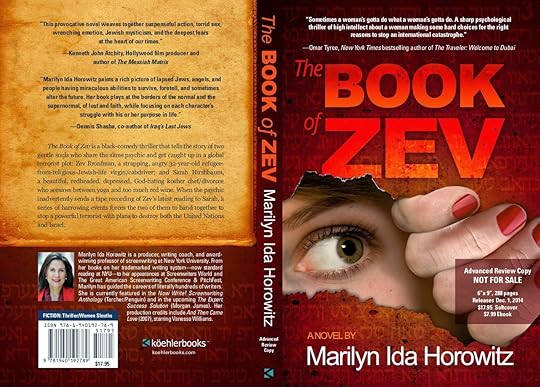
Praise for Marilyn Ida Horowitz and The Book of Zev
“This provocative novel weaves together suspenseful action, torrid sex, wrenching emotion, Jewish mysticism, and the deepest fears at the heart of our times.” –Kenneth John Atchity, Hollywood producer and author of The Messiah Matrix
“A galvanizing work combining espionage, paranormal phenomena, religion, intrigue, and the realization that everything is political. Horowitz synthesizes these ideas within a psychological tapestry that showcases the decisionmaking prowess of a woman juggling survival and cultural identity.” –Charles Coleman, Film Program Director, Facets Cinémathèque, Chicago
“A fast-paced political thriller that never loses sight of its heart: a skeptical woman searching for love and a faith she can live with, all while saving the world. A truly original heroine.” –Chap Taylor, screenwriter, Changing Lanes
“Funny, fast-paced, and highly enjoyable.”–D.P. Lyle, award-winning author of the Samantha Cody and Dub Walker thriller series
“A devilishly delicious feast and deeply imagined comedic thriller blending Kabbalah, the Bible, contemporary times, geopolitics, and life's absurdities in Portnoyesque fashion.”–Mark Rubinstein, award-winning author of Mad Dog Houseand Love Gone Mad
“A fun book, original and full of surprises.”–Abby Westlake, writer and widow of author Donald Westlake
“Horowitz's storytelling—twisty, sexy, smart—is so skillful, it's hard to believe this is her debut novel.”–Michael Zam, former Associate Director of Programs in Humanities, NYU
“Well-drawn complex characters, tight suspense, action, and a healthy sprinkle of sexuality make this book a satisfying read.”–Kristen Houghton, award-winning author of For I Have Sinned: A Cate Harlow Private Investigation
An exciting thriller about two gentle people who prevent a terrorist from blowing up the U.N. and Israel.


Praise for Marilyn Ida Horowitz and The Book of Zev
“This provocative novel weaves together suspenseful action, torrid sex, wrenching emotion, Jewish mysticism, and the deepest fears at the heart of our times.” –Kenneth John Atchity, Hollywood producer and author of The Messiah Matrix
“A galvanizing work combining espionage, paranormal phenomena, religion, intrigue, and the realization that everything is political. Horowitz synthesizes these ideas within a psychological tapestry that showcases the decisionmaking prowess of a woman juggling survival and cultural identity.” –Charles Coleman, Film Program Director, Facets Cinémathèque, Chicago
“A fast-paced political thriller that never loses sight of its heart: a skeptical woman searching for love and a faith she can live with, all while saving the world. A truly original heroine.” –Chap Taylor, screenwriter, Changing Lanes
“Funny, fast-paced, and highly enjoyable.”–D.P. Lyle, award-winning author of the Samantha Cody and Dub Walker thriller series
“A devilishly delicious feast and deeply imagined comedic thriller blending Kabbalah, the Bible, contemporary times, geopolitics, and life's absurdities in Portnoyesque fashion.”–Mark Rubinstein, award-winning author of Mad Dog Houseand Love Gone Mad
“A fun book, original and full of surprises.”–Abby Westlake, writer and widow of author Donald Westlake
“Horowitz's storytelling—twisty, sexy, smart—is so skillful, it's hard to believe this is her debut novel.”–Michael Zam, former Associate Director of Programs in Humanities, NYU
“Well-drawn complex characters, tight suspense, action, and a healthy sprinkle of sexuality make this book a satisfying read.”–Kristen Houghton, award-winning author of For I Have Sinned: A Cate Harlow Private Investigation

Published on December 01, 2014 00:00
November 29, 2014
Jerry Amernic Author of The Last Witness in Writers’ Roundtable Discussions
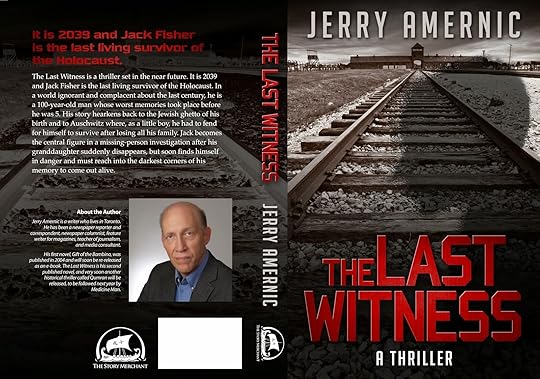
Jerry Amernic will be one of the featured novelists taking part in writers’ roundtable discussions for the International Thriller Writers over the next three weeks.
Topic for the week of December 1-7 – Is fear the most common emotion in a thriller? What other emotions run through your favorite thrillers?
Topic for the week of December 8-14 – For many, it takes months to draft a novel and consistency can suffer. Names, vehicles, time required for a familiar walk may vary. How do you organize the details to ensure consistency?
Topic for the week of December 15-21 – Did your editor insist on a title change? Why are some titles magic and what are some of your favorites?
Over 9,000 downloads of The Last Witness in one week
In a one-week promotion offering free Kindle downloads of Jerry’s latest novel The Last Witness, more than 9,000 people took up the offer.

Published on November 29, 2014 00:00
November 26, 2014
PEN American Center's First Edition / Second Thoughts Auction Includes Works We Could Only Dream of Owning
PEN America describes the process that went into this auction, as well as the authors’ thoughts in participating (spoiler: Some writers were, say, hesitant, to return to their works) in the event in a video.
Literature-lovers anywhere: If you’re planning a trip to New York City anytime soon, make sure it falls around the end of November. The organizers of PEN American Center’s First Edition / Second Thoughts auction have asked your favorite authors to annotate their iconic works of literature to sell off. They will be on display for the public at Christie’s New York from November 17 until they are auctioned on December 2.
More than 75 famous authors are participating in the project, including Toni Morrison with Beloved, Jhumpa Lahiri with The Interpreter of Maladies, Joyce Carol Oates with Them, and Marilynne Robinson with Housekeeping. Children’s and young adult authors are also joining the charity auction; notably Eric Carle will take another look at his iconic picture book The Very Hungry Caterpillar, and Katherine Paterson will go back to her heartbreaking novel The Bridge To Terabithia .
“Annotated” is a bit of a misnomer when you’re talking about the First Edition / Second Thoughts auction. These authors have created literary relics with major updates and additions, including new essays, photographs, drawings and illustrations, memorabilia, behind-the-scenes notes, and letters to the reader. For instance, in Patti Smith’s National Book Award for Nonfiction-winning Just Kids, she writes under a picture of herself with Robert Mapplethorpe, “He protected me. He was strong.” On the first page of Underworld, Don Delilo writes:
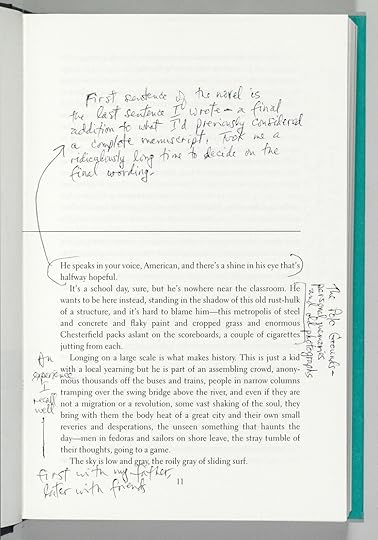
Gillian Flynn includes ink drawing in her copy of Gone Girl:
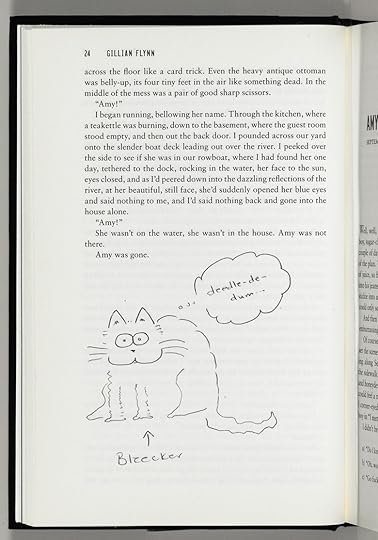
And Eric Carle details the biggest change he would make to the cover of his beloved children’s book:
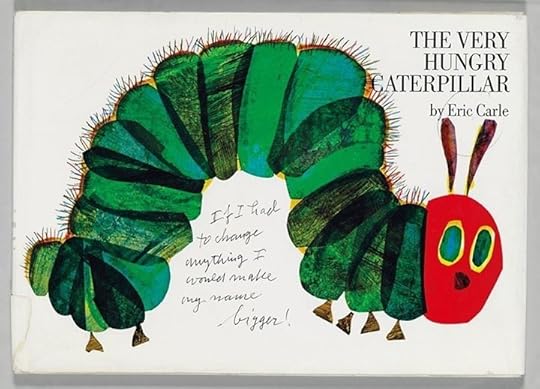
Though you’ll probably need deep pockets (keep reaching!) to take home one of these annotated copies, you can try your hand at bidding in the auction. If you’re in the city, you can bid in person on December 2 at the Christie’s Saleroom at 7 p.m. The event itself is free. If you can’t make it to New York, there is a way to bid online or by phone. All proceeds will go to the PEN American Center and its mission.
The PEN American Center, the biggest subset of PEN International, is a writers’ association that has a mission to defend free expression. It was founded after World War I amid ethnic and racial tensions among countries. The association hopes to foster international literary fellowship and advance literature.
Images: PEN American Center
Reposted from Bustle

Literature-lovers anywhere: If you’re planning a trip to New York City anytime soon, make sure it falls around the end of November. The organizers of PEN American Center’s First Edition / Second Thoughts auction have asked your favorite authors to annotate their iconic works of literature to sell off. They will be on display for the public at Christie’s New York from November 17 until they are auctioned on December 2.
More than 75 famous authors are participating in the project, including Toni Morrison with Beloved, Jhumpa Lahiri with The Interpreter of Maladies, Joyce Carol Oates with Them, and Marilynne Robinson with Housekeeping. Children’s and young adult authors are also joining the charity auction; notably Eric Carle will take another look at his iconic picture book The Very Hungry Caterpillar, and Katherine Paterson will go back to her heartbreaking novel The Bridge To Terabithia .
“Annotated” is a bit of a misnomer when you’re talking about the First Edition / Second Thoughts auction. These authors have created literary relics with major updates and additions, including new essays, photographs, drawings and illustrations, memorabilia, behind-the-scenes notes, and letters to the reader. For instance, in Patti Smith’s National Book Award for Nonfiction-winning Just Kids, she writes under a picture of herself with Robert Mapplethorpe, “He protected me. He was strong.” On the first page of Underworld, Don Delilo writes:
First sentence of the novel is the last sentence I wrote — a final edition to what I previously considered a complete manuscript. Took me a ridiculously long time to decide on the final wording.

Gillian Flynn includes ink drawing in her copy of Gone Girl:

And Eric Carle details the biggest change he would make to the cover of his beloved children’s book:

Though you’ll probably need deep pockets (keep reaching!) to take home one of these annotated copies, you can try your hand at bidding in the auction. If you’re in the city, you can bid in person on December 2 at the Christie’s Saleroom at 7 p.m. The event itself is free. If you can’t make it to New York, there is a way to bid online or by phone. All proceeds will go to the PEN American Center and its mission.
The PEN American Center, the biggest subset of PEN International, is a writers’ association that has a mission to defend free expression. It was founded after World War I amid ethnic and racial tensions among countries. The association hopes to foster international literary fellowship and advance literature.
Images: PEN American Center
Reposted from Bustle

Published on November 26, 2014 00:00
November 24, 2014
BET founder launches Urban Movie Channel
 RLJ Entertainment, headed by Black Entertainment Television (BET) founder Robert L. Johnson, announced on Wednesday that it is entering the SVOD space with the Urban Movie Channel (UMC), featuring dramas, documentaries, comedies, horror films and stage plays.
RLJ Entertainment, headed by Black Entertainment Television (BET) founder Robert L. Johnson, announced on Wednesday that it is entering the SVOD space with the Urban Movie Channel (UMC), featuring dramas, documentaries, comedies, horror films and stage plays.At launch, it offers catalog titles, but a UMC spokesperson says it plans to offer original programming in the future, as well as exclusive premieres, beginning with Love the One You’re With, which debuts on Nov. 14. The service is only available in the United States.
“As founder of BET, I have gained a deep understanding and knowledge about the African-American and urban consumer and the entertainment content that appeals to them,” said Johnson (pictured) in a statement. “UMC was designed so that the African-American and urban creative community could directly reach consumers in a way that removes many of the restrictions associated with the legacy content development and distribution models. As more video is consumed over broadband, we believe that we can quickly become the preeminent provider of quality urban entertainment to what has largely been an under-served, yet highly-engaged audience.”
At launch, UMC features more than 150 titles, including live stand-up performances by Kevin Hart, Jamie Foxx, and Charlie Murphy; documentaries Dark Girls and I Ain’t Scared of You: A Tribute to Bernie Mac; feature films All Things Fall Apart starring 50 Cent, Mario Van Peebles and Ray Liotta, and The Suspect starring Mekhi Phifer, and the stage play What My Husband Doesn’t Know by David E. Talbert. Additional content will be added every month.
Programs previously released by RLJE under the One Village brand will be incorporated into UMC’s library, which will also include titles from RLJE’s existing Image independent feature film line.
UMC will launch with a free trial period for subscribers through Feb. 4, after which it will offer an introductory price of $2.99/month, or $29.99 a year. Thereafter, the price will be $4.99/month or $49.99/year.
The leadership team at RLJE is headed by Johnson, who is founder and chairman, and Miguel Penella, CEO. The company’s marketing, public relations and investor relations is being overseen by Traci Otey Blunt, RLJE’s EVP of marketing and corporate affairs.
A UMC spokesperson said the channel will be promoted primarily with web advertising and social media, as well as through traditional public relations avenues.
Reposted from Stream Daily

Published on November 24, 2014 00:00
November 21, 2014
Cormac McCarthy’s Three Punctuation Rules, and How They All Go Back to James Joyce
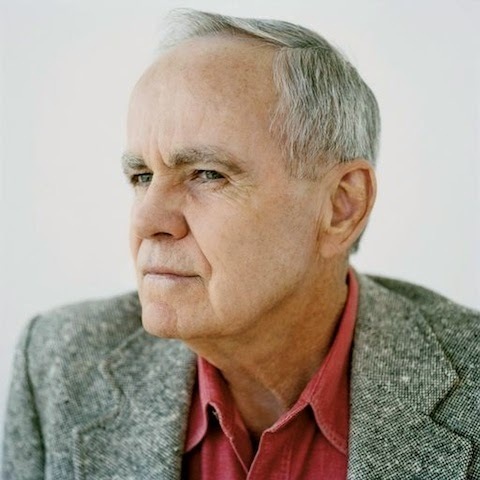
Cormac McCarthy has been—as one 1965 reviewer of his first novel, The Orchard Tree, dubbed him—a “disciple of William Faulkner.” He makes admirable use of Faulknerian traits in his prose, and I’d always assumed he inherited his punctuation style from Faulkner as well. But in his very rare 2008 televised interview with Oprah Winfrey, McCarthy cites two other antecedents: James Joyce and forgotten novelist MacKinlay Kantor, whose Andersonville won the Pulitzer Prize in 1955. Joyce’s influence dominates, and in discussion of punctuation, McCarthy stresses that his minimalist approach works in the interest of maximum clarity. Speaking of Joyce, he says,
James Joyce is a good model for punctuation. He keeps it to an absolute minimum. There’s no reason to blot the page up with weird little marks. I mean, if you write properly you shouldn’t have to punctuate.
So what “weird little marks” does McCarthy allow, or not, and why? Below is a brief summary of his stated rules for punctuation:
1. Quotation Marks:
McCarthy doesn’t use ‘em. In his Oprah interview, he says MacKinlay Kantor was the first writer he read who left them out. McCarthy stresses that this way of writing dialogue requires particular deliberation. Speaking of writers who have imitated him, he says, “You really have to be aware that there are no quotation marks, and write in such a way as to guide people as to who’s speaking.” Otherwise, confusion reigns.
2. Colons and semicolons:
Careful McCarthy reader Oprah says she “saw a colon once” in McCarthy’s prose, but she never encountered a semicolon. McCarthy confirms: “No semicolons.”
Of the colon, he says: “You can use a colon, if you’re getting ready to give a list of something that follows from what you just said. Like, these are the reasons.” This is a specific occasion that does not present itself often. The colon, one might say, genuflects to a very specific logical development, enumeration. McCarthy deems most other punctuation uses needless.
3. All other punctuation:
Aside from his restrictive rationing of the colon, McCarthy declares his stylistic convictions with simplicity: “I believe in periods, in capitals, in the occasional comma, and that’s it.” It’s a discipline he learned first in a college English class, where he worked to simplify 18th century essays for a textbook the professor was editing. Early modern English is notoriously cluttered with confounding punctuation, which did not become standardized until comparatively recently.
McCarthy, enamored of the prose style of the Neoclassical English writers but annoyed by their over-reliance on semicolons, remembers paring down an essay “by Swift or something” and hearing his professor say, “this is very good, this is exactly what’s needed.” Encouraged, he continued to simplify, working, he says to Oprah, “to make it easier, not to make it harder” to decipher his prose. For those who find McCarthy sometimes maddeningly opaque, this statement of intent may not help clarify things much. But lovers of his work may find renewed appreciation for his streamlined syntax.
Reposted from Open Culture
Josh Jones is a writer and musician based in Washington, DC. Follow him at @jdmagness

Published on November 21, 2014 00:00
November 19, 2014
Guest Post: Perfect Timing, and How to Get It by Dennis Palumbo
Hollywood on the Couch The inside scoop on Tinseltown, USA. by Dennis Palumbo Knowing what to write and when to write it
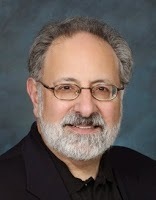 Back in high school, during the late 1960’s, I was part of a tragically un-hip rock band. Desperate to make it big (at least in Pittsburgh), and to ride the wave of the current fashion, we pooled all our available cash and purchased five extremely groovy Nehru jackets. I swear, the very next day, Nehru jackets were “out.” No self-respecting rocker would be caught dead in one.
Back in high school, during the late 1960’s, I was part of a tragically un-hip rock band. Desperate to make it big (at least in Pittsburgh), and to ride the wave of the current fashion, we pooled all our available cash and purchased five extremely groovy Nehru jackets. I swear, the very next day, Nehru jackets were “out.” No self-respecting rocker would be caught dead in one.
What this anecdote illustrates, among other things, is the peril of bad timing. I’ve certainly seen this in my work with the creative patients in my therapy practice. Over the years, this painful, maddening aspect of the artistic life has been a common complaint, especially among writers.
“The timing sucked,” a disgruntled TV or screenwriter will say, as another cherished project fails to take wing.
We all know what that’s about. You labor for months on a spec feature script about a murder on a space station, for example, only to learn that a similar idea’s just been put into production. Or you have a great idea for an historical romance, but your agent convinces you it’s not commercial. Then, the following year, two films with similar themes are released to great critical and box-office success.
Recently, I saw an author on PBS whose novel was then riding high on the best-seller lists. He revealed that he’d actually written it 25 years before, but its “government conspiracy”-themed story got it rejected by a dozen publishers.
“This was the post-Watergate era,” he explained. “Political cover-ups weren’t considered sexy anymore.” Only after the recent revelations of the NSA’s dubious actions in the name of national security, and the success of TV series like Homeland, was the author emboldened to send his (updated) manuscript out again. This time it was accepted by the first publisher who read it.
Timing. Every writer has felt its favor and its sting. Certainly, Hollywood is filled with stories of languishing scripts miraculously resuscitated by the interest of an actor who was suddenly bankable enough to get the movie made. Conversely, numerous films and TV series---apparently ahead of their time---appeared before the audience was ready for the material and thus failed.
“So?” you may be saying.The timing of what we write and when we write it is out of our control, right? Case in point: the creators of the cult TV series Archer have portrayed their heroes working for a spy agency called, unfortunately, ISIS. Now, given the current association with that acronym, they’ve announced that the agency’s name will change.
They’re not alone. Every day, films, books and TV series are routinely scuttled by the emotional intensity or political sensitivity of current events. (Just as an equal number of projects seek to capitalize on these same events.)
Yes, timing---like success---is essentially out of our control. However, also like success, there are certain things a writer can do to improve the odds.
For example, writers of all stripes need to be aware of the times in which they live---culturally, politically, and artistically. You might not be lucky enough to write something that hits just as the next wave of the zeitgeist is cresting, but you ought to at least be somewhere near the beach. Nothing is so dispiriting as reading a novel or seeing a film by a veteran writer who seems not to have looked out a window in 20 years.
In addition, the chances of being favored by good fortune (another definition of great timing) improve to the degree to which you apply effort. Pushing yourself to go deeper into character and narrative, to toil more consistently at your craft, to take creative risks. I’m speaking, regrettably, about hard work.
I know too many writers who steadfastly refuse to write a new spec script or take a fresh pass at a novel that isn’t working. In my view, they need to see their task not merely as the completion of this or that project, but as an ongoing, unfolding process of craft-building and discovery, whereby the rewards (if they are to come) arrive unannounced and unforeseen. In which case, success then no longer seems a product of good timing but of dutiful, consistent labor.
As legendary golfer Ben Hogan remarked when praised for his good luck on the green, “Yes, I’m lucky. And the harder I work, the luckier I get.”
Does hard work and artistic relevance guarantee that the gods of timing will smile on your efforts? Nope. But then, if you want guarantees, you’re in the wrong business.
However, there’s one thing I can guarantee will reduce even the possibility of good timing in one’s career: attempting to coerce or anticipate it. Like in my story about the Nehru jackets, all such attempts at success by pursuing the currently fashionable are by their nature doomed. Such as trying to write a thriller “just like” the ones topping the best-seller lists. Or trying to craft an R-rated comedic romp “just like” the ones tearing up the box office.
Sorry to say, in terms of mass appeal, that particular ship has sailed. That cultural moment has passed. And while such moments may be occasionally revisited, as with “retro” clothes and re-booted TV shows, the triumphs are brief, little more than nostalgic back-steps on the continuing path toward an unknown future.
See, that’s the paradox of timing: the only possible preparation for showing up at the right time with the right product involves working authentically in the here-and-now, oblivious to what the outcome of your labors will be.
Which brings me back to my sorry little band. Rather than spending money on new jackets, we would have been better off spending more time rehearsing. Not that I’m convinced this would’ve propelled us to rock ‘n’ roll fame and fortune---but, hey, stranger things have happened. It’s all in the timing.
Formerly a Hollywood screenwriter (My Favorite Year; Welcome Back, Kotter, etc.), DENNIS PALUMBO is a licensed psychotherapist and the author of the Daniel Rinaldi mystery series. For more info, please visit www.dennispalumbo.com.
Reposted from Hollywood on the Couch

 Back in high school, during the late 1960’s, I was part of a tragically un-hip rock band. Desperate to make it big (at least in Pittsburgh), and to ride the wave of the current fashion, we pooled all our available cash and purchased five extremely groovy Nehru jackets. I swear, the very next day, Nehru jackets were “out.” No self-respecting rocker would be caught dead in one.
Back in high school, during the late 1960’s, I was part of a tragically un-hip rock band. Desperate to make it big (at least in Pittsburgh), and to ride the wave of the current fashion, we pooled all our available cash and purchased five extremely groovy Nehru jackets. I swear, the very next day, Nehru jackets were “out.” No self-respecting rocker would be caught dead in one.What this anecdote illustrates, among other things, is the peril of bad timing. I’ve certainly seen this in my work with the creative patients in my therapy practice. Over the years, this painful, maddening aspect of the artistic life has been a common complaint, especially among writers.
“The timing sucked,” a disgruntled TV or screenwriter will say, as another cherished project fails to take wing.
We all know what that’s about. You labor for months on a spec feature script about a murder on a space station, for example, only to learn that a similar idea’s just been put into production. Or you have a great idea for an historical romance, but your agent convinces you it’s not commercial. Then, the following year, two films with similar themes are released to great critical and box-office success.
Recently, I saw an author on PBS whose novel was then riding high on the best-seller lists. He revealed that he’d actually written it 25 years before, but its “government conspiracy”-themed story got it rejected by a dozen publishers.
“This was the post-Watergate era,” he explained. “Political cover-ups weren’t considered sexy anymore.” Only after the recent revelations of the NSA’s dubious actions in the name of national security, and the success of TV series like Homeland, was the author emboldened to send his (updated) manuscript out again. This time it was accepted by the first publisher who read it.
Timing. Every writer has felt its favor and its sting. Certainly, Hollywood is filled with stories of languishing scripts miraculously resuscitated by the interest of an actor who was suddenly bankable enough to get the movie made. Conversely, numerous films and TV series---apparently ahead of their time---appeared before the audience was ready for the material and thus failed.
“So?” you may be saying.The timing of what we write and when we write it is out of our control, right? Case in point: the creators of the cult TV series Archer have portrayed their heroes working for a spy agency called, unfortunately, ISIS. Now, given the current association with that acronym, they’ve announced that the agency’s name will change.
They’re not alone. Every day, films, books and TV series are routinely scuttled by the emotional intensity or political sensitivity of current events. (Just as an equal number of projects seek to capitalize on these same events.)
Yes, timing---like success---is essentially out of our control. However, also like success, there are certain things a writer can do to improve the odds.
For example, writers of all stripes need to be aware of the times in which they live---culturally, politically, and artistically. You might not be lucky enough to write something that hits just as the next wave of the zeitgeist is cresting, but you ought to at least be somewhere near the beach. Nothing is so dispiriting as reading a novel or seeing a film by a veteran writer who seems not to have looked out a window in 20 years.
In addition, the chances of being favored by good fortune (another definition of great timing) improve to the degree to which you apply effort. Pushing yourself to go deeper into character and narrative, to toil more consistently at your craft, to take creative risks. I’m speaking, regrettably, about hard work.
I know too many writers who steadfastly refuse to write a new spec script or take a fresh pass at a novel that isn’t working. In my view, they need to see their task not merely as the completion of this or that project, but as an ongoing, unfolding process of craft-building and discovery, whereby the rewards (if they are to come) arrive unannounced and unforeseen. In which case, success then no longer seems a product of good timing but of dutiful, consistent labor.
As legendary golfer Ben Hogan remarked when praised for his good luck on the green, “Yes, I’m lucky. And the harder I work, the luckier I get.”
Does hard work and artistic relevance guarantee that the gods of timing will smile on your efforts? Nope. But then, if you want guarantees, you’re in the wrong business.
However, there’s one thing I can guarantee will reduce even the possibility of good timing in one’s career: attempting to coerce or anticipate it. Like in my story about the Nehru jackets, all such attempts at success by pursuing the currently fashionable are by their nature doomed. Such as trying to write a thriller “just like” the ones topping the best-seller lists. Or trying to craft an R-rated comedic romp “just like” the ones tearing up the box office.
Sorry to say, in terms of mass appeal, that particular ship has sailed. That cultural moment has passed. And while such moments may be occasionally revisited, as with “retro” clothes and re-booted TV shows, the triumphs are brief, little more than nostalgic back-steps on the continuing path toward an unknown future.
See, that’s the paradox of timing: the only possible preparation for showing up at the right time with the right product involves working authentically in the here-and-now, oblivious to what the outcome of your labors will be.
Which brings me back to my sorry little band. Rather than spending money on new jackets, we would have been better off spending more time rehearsing. Not that I’m convinced this would’ve propelled us to rock ‘n’ roll fame and fortune---but, hey, stranger things have happened. It’s all in the timing.
Formerly a Hollywood screenwriter (My Favorite Year; Welcome Back, Kotter, etc.), DENNIS PALUMBO is a licensed psychotherapist and the author of the Daniel Rinaldi mystery series. For more info, please visit www.dennispalumbo.com.
Reposted from Hollywood on the Couch

Published on November 19, 2014 00:00
Reviewing the Evidence Reviews Dennis Palumbo's Phantom Limb
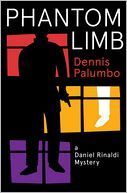 PHANTOM LIMB
PHANTOM LIMB
by Dennis Palumbo
Poisoned Pen, September 2014
250 pages
$14.95
ISBN: 1464202567

Buy in the
Dennis Palumbo has written a fourth mystery featuring psychologist Daniel Rinaldi, consultant for the Pittsburgh Police Department. As in previous books of this series, Rinaldi spends little time in his office listening to patients and much time chasing after perpetrators and rescuing victims. At the start of the book, the initial appointment of a new client - former porn star Lisa Hartland, now the trophy wife of an aging multi-millionaire - ends with Rinaldi punched unconscious and Lisa kidnapped. Lisa had visited Rinaldi because she was on the verge of suicide and wanted one last chance to be talked out of killing herself. The real reason for her despondency is not revealed until later in the book. This assault and kidnapping is only the first of a long string of heinous crimes perpetrated by a pair of sadistic criminals.
Although the police and FBI believe they can identify the culprits, Palumbo presents us with a number of possible accomplices and masterminds. Rinaldi has the skills that allow people to confide in him and he is able to eliminate suspects by having them open up to him. He is able to figure out their psychology and understand what makes them do what they do, but he is not easily able to find and stop them. He comes close to death more than once, as does his ally, FBI agent Gloria Reese. Rinaldi never seems to get enough sleep or food, as his phone is constantly ringing to inform him of either another crime or another demand for him to respond to.
Lisa's husband Charles, a self-centered invalid in a wheel chair, is clear that no expense will be spared for his wife's return and plans to meet the ransom demand of several million dollars. For reasons that we soon learn, the kidnappers want Rinaldi to deliver the ransom personally. He agrees to do this, as Lisa is his client, and this decision involves him in a series of violent and deadly events. All his cleverness and resilience are needed as he faces these harrowing situations.
One of the author's skills is creating a strong sense of place. As in previous Rinaldi books, the city of Pittsburgh - its neighborhoods, its weather, its bars and outskirts - figure strongly in the tale. Palumbo has also created a multi-layered, enigmatic character in his protagonist. Although an educated professional with a cerebral job, Rinaldi is quick to lash out with his fists when provoked. We learn that an abusive childhood with a father who forced him to fight has left him with deep anger issues. And then there is the back-story of his dead wife Barbara, supposedly killed during a robbery. The kidnapping/murder cases are solved by the end of PHANTOM LIMB, but Palumbo leaves us with a personal Rinaldi cliffhanger. The reader will eagerly await the next volume in this series to learn how that plays out.
§Anne Corey is a writer, poet, teacher and botanical artist in New York's Hudson Valley.
Reviewed by Anne Corey, November 2014

Published on November 19, 2014 00:00



